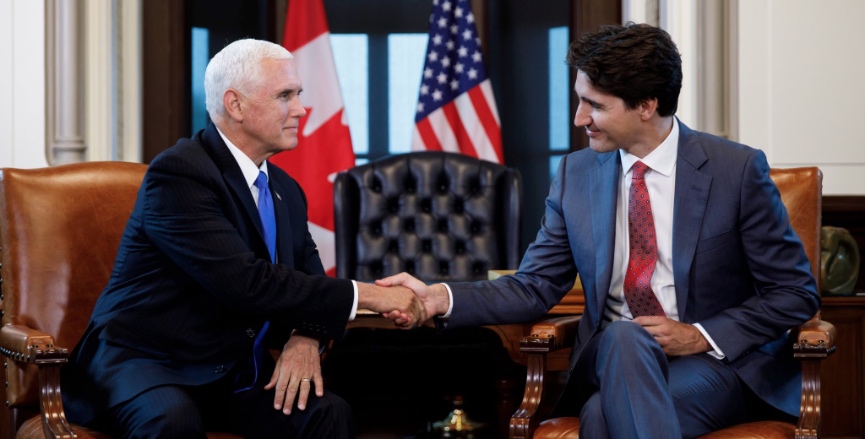Last Thursday following a 50-minute meeting in Ottawa with the Canadian prime minister, U.S. Vice-President Mike Pence announced that he was “honoured to be here today on behalf of a friend of yours, and a great friend of the Canadian people, President Donald Trump.”
It is doubtful many Canadians were taken in by a profession of friendship by the U.S. vice-president on behalf of President Trump.
Justin Trudeau, however, has entrusted negotiating the welfare of two Canadians arrested in China to the Trump administration.
Pence pledged that in its trade talks with China the U.S. would work to secure the release of the Canadians held by Beijing.
What the U.S. vice-president cannot do is repair the damage done to Canadian relations with China before former diplomat Michael Kovrig and entrepreneur Michael Spavor were detained and jailed as imagined threats to Chinese national security.
That action was undertaken in retaliation for Canada acting on an extradition request by the U.S., and arresting Huawei senior executive Meng Wanzhou last mid-December at the Vancouver airport.
Asked about the U.S. agreeing to link Chinese trade talks, and the release of the two Canadians, Chinese foreign ministry official Geng Shuang told Reuters, “We hope that the Canadian side will come to understand the full consequences of pulling chestnuts from the fire on behalf of the United States, and not inflict more harm on themselves,”
The Chinese authorities surmised that since Canada was prepared, on dubious grounds, to slight China, by arresting the daughter of the founder, and the number two figure in its leading tech company — in order to please the U.S. — the Canadian government could not go unpunished.
As a result Canadian commercial sales to China have plummeted. Agricultural exports to China, promoted by the Diefenbaker government in the late 1950s — a decade before Canada and China established diplomatic relations — have been curtailed. Canadian canola, peas, soybeans and pork are being boycotted by China.
The gigantic Canadian investment in LNG production destined for China has become problematic.
The Trump administration has launched an all-out offensive against Huawei, the Chinese telecommunications giant.
Huawei is widely believed to be the most advanced and efficient provider of next Internet 5G materials: it is also the main rival of American telecommunications firms.
American companies doing business with Huawei now have to request permission from the U.S. government before supplying it with equipment. This measure has blocked the supply chains Huawei relies on to make its telephones and switching systems.
As the era of 5G telecommunications arrives, the U.S. wants its allies and trading partners to boycott Huawei equipment on grounds that it acts as an agent of the Chinese government, and could give China access to sensitive data and information.
The recent Huawei offensive comes as the Trump administration has mounted a major trade war with China. When trade negotiations collapsed last month, Trump bumped up protectionist tariffs on $200-billion of Chinese imports from 10 per cent to 15 per cent
The collateral damage from the escalating disagreements with China include falling U.S. stock markets, and rising tensions with major U.S. trading partners, notably in Europe, anxious to retain good trading relations with both the U.S. and China.
It is routinely asserted particularly by economists, that the economy can be considered separately from the political world, that it exists as an independent entity subject to own laws of motion.
The trade relationship between China, and the U.S., reveals that commerce has as much to do with questions of power and authority as with flexible prices adjusting supply and demand for goods and services.
The U.S. wants to block the ascension of China. This policy predates Trump. Under Obama it was called the “pivot to China” and included the Asia Pacific Trade Deal (abandoned by Trump) which was aimed at curtailing the Chinese economic model of limits on foreign ownership, sharing intellectual property rights, requirements for joint partnerships, and promotion of state owned enterprises.
The Made In China 2025 Chinese initiative is to replace dependence on foreign technology with Chinese products based on domestic research and development.
The action by Trump against Huawei validates the Chinese concern that it cannot depend on the U.S. (or other Western countries) for its own economic development.
Canada meanwhile, complicit in the U.S. attack on Huawei, and now calling on the U.S. to get China to halt its crossfire, looks less like an independent state, and more like a U.S. dependent territory.
Duncan Cameron is president emeritus of rabble.ca and writes a weekly column on politics and current affairs.
Photo: Justin Trudeau/Twitter
Make rabble sustainable. Please consider supporting our work with a monthly donation and join us as we take on the 2019 election. Support rabble.ca today for as little as $1 per month!




